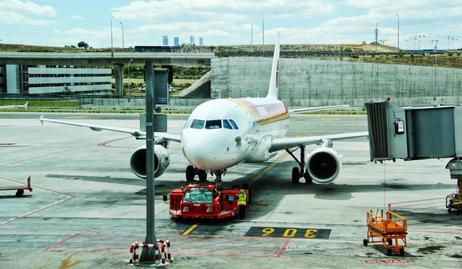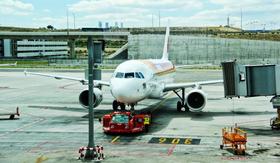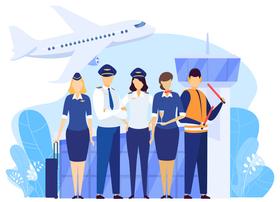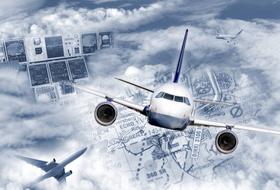Unlocking Airport Career Opportunities: Your Guide to Ground Jobs
As a classical musician, teacher, and writer, I've always been fascinated by the intricate symphony of airport activity. Indeed, as I write this, I have the live cam at Midway Airport in Chicago streaming dozens of Boeing 737s in Southwest Airlines fleet being deiced. Also, there's a team of runway sweepers called "brooms" sweeping the snow off the active runway and taxiways and planes taking off and landing. Yes, I am an unabashed Av Geek!
In any case, I want to highlight some of the jobs essential to the smooth operation of the more than 5100 airports with commercial airline service in the U.S.A. It's not just the planes that keep things moving; the hardworking individuals on the ground ensure everything runs smoothly. As you can see from the list below, there is a job at an airport for anyone with any background, experience, and training. If you've been laid off or are just starting your career, check out what your local airport offers.
From the moment you step into the airport until your plane takes off, countless professionals work behind the scenes to make your journey possible.
- These unsung heroes include check-in agents who greet you with a smile (and lightning-fast keyboard skills).
- These baggage handlers ensure your luggage reaches your destination, and aircraft mechanics keep those metal birds in top shape.
- Let's not forget the air traffic controllers orchestrating a complex aerial ballet or the TSA agents keeping us all safe.
What's truly remarkable is the diversity of these positions.
- These jobs range in compensation from $25,000 to over $100,000 annually, depending on the location, experience level, and several other factors. It's a field with room for growth and specialization.
- The best part? Your local community college can provide training for most of these positions.
- Whether you're interested in becoming an FAA-certified Aircraft Mechanic or pursuing a career in airport operations, community colleges offer programs tailored to the aviation industry's needs.
So, the next time you're at the airport, take a moment to appreciate the complex choreography happening around you. It's not just a transit point; it's a workplace for thousands of dedicated professionals keeping the wheels of air travel turning. And who knows? You could be part of this exciting world with the proper training.
This video offers a behind-the-scenes look at Atlanta's airport.
Customer Service Roles
- Check-in Agents: High school diploma or equivalent; keyboard proficiency required
- Gate Agents: High school diploma or equivalent; keyboard proficiency required
- Customer Service Representatives: High school diploma or equivalent; keyboard proficiency required
- Passenger Service Agents: High school diploma or equivalent; additional training for assisting passengers with special needs; keyboard proficiency required
Baggage and Cargo Handling
- Baggage Handlers: High school diploma or equivalent; valid driver's license
- Ramp Agents: High school diploma or equivalent; valid driver's license
- Cargo Handlers: High school diploma or equivalent; valid driver's license
Aircraft Servicing
- Aircraft Fuelers: High school diploma or equivalent; valid driver's license; hazardous materials handling certification may be required
- Aircraft Cleaners: No specific educational requirements, but a high school diploma may be preferred
- Aircraft Mechanics: FAA Airframe and Powerplant (A&P) license; associate's or bachelor's degree in aviation maintenance technology often preferred
- Deicing Technicians: High school diploma or equivalent; specific deicing certification and training
Ground Operations
- Marshallers: High school diploma or equivalent; valid driver's license
- Tug Drivers: High school diploma or equivalent; valid driver's license; specific equipment operation certifications may be required
- Ground Equipment Operators: High school diploma or equivalent; valid driver's license; specific equipment operation certifications may be required
Airport Operations
- Airport Operations Agents: Bachelor's degree in aviation management, business administration, or related field often preferred; keyboard proficiency required
- Airfield Maintenance Workers: High school diploma or equivalent; specific certifications for equipment operation may be required
- Security Screeners: High school diploma or equivalent; Transportation Security Administration (TSA) certification
Specialized Roles
- Air Traffic Controllers: Bachelor's degree, completion of an FAA-approved education program, passing FAA pre-employment tests
- Flight Dispatchers: FAA aircraft dispatcher certificate; some employers may prefer a college degree in aviation-related fields; keyboard proficiency required
- Airline Catering Staff: No specific educational requirements, but food handling certification may be required
Support Services
- Information Desk Staff: High school diploma or equivalent; customer service experience often preferred; keyboard proficiency required
- Retail and Food Service Workers: No specific educational requirements, but food handling certification may be required for food service positions.
- Janitorial Staff: No specific educational requirements
This video offers a look at what Fixed Base Operators (FBOs) do.
FBO
Fixed Base Operators (FBOs) are essential facilities found at most small, medium, and large hub airports, providing services for private and business aviation. I include them because they offer a variety of positions similar to what you will find on the commercial side of small, medium, and large hub airports.
- These private terminals offer a more exclusive and personalized experience than commercial airport operations.
- Typical jobs at an FBO include customer service representatives, line service technicians, flight coordinators, dispatchers, and facility managers.
- For several reasons, working at an FBO typically offers a less stressful customer-facing experience than commercial aviation.
- Firstly, FBOs cater to a smaller, affluent clientele, including business executives and high-net-worth individuals, who often have more flexible schedules and fewer time constraints.
- They demand a very high level of personalized service and attention to detail.
- Secondly, the lower traffic volume at FBOs means staff can dedicate more time to each client, resulting in a superior customer experience.
- Lastly, an FBO's luxurious and comfortable environment, coupled with the generally more relaxed atmosphere, makes it a pleasant workplace.
Summary
The airline industry offers diverse ground operations jobs suitable for people of all ages and backgrounds. This variety of opportunities makes airports excellent places for experienced workers and those just starting their careers. The aviation sector also provides employment stability, as airports are essential public infrastructures operating even during economic downturns. That makes them attractive options for job seekers looking for long-term career prospects.
Questions? Contact us on Facebook, Instagram, and YouTube. @communitycollegereview
#AirportCareers #Aviation Jobs #CommunityCollegeTraining #FAACertification #AircraftMechanicSocial Media















